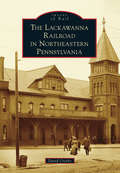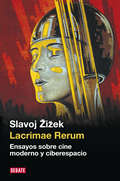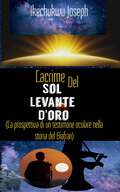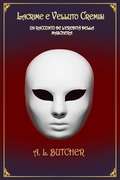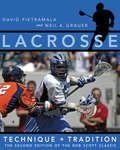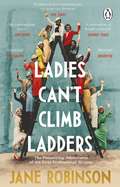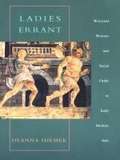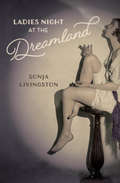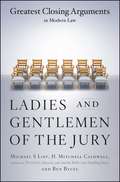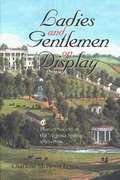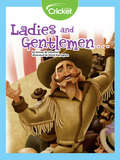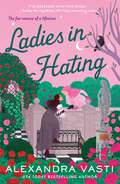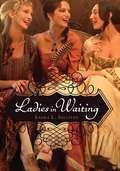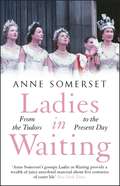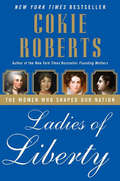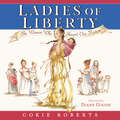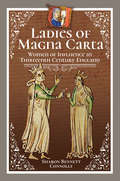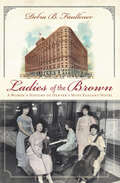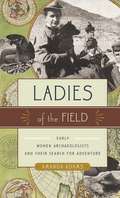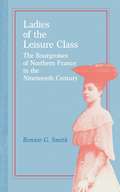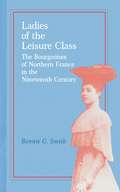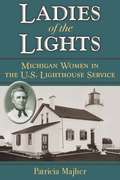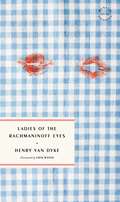- Table View
- List View
Lackawanna Railroad in Northeastern Pennsylvania, The
by David CrosbyThe Delaware, Lackawanna & Western Railroad, better known as the Lackawanna Railroad, was organized in 1851 and thrived on the anthracite coal traffic originating from the area surrounding Scranton, Pennsylvania. The company came to operate a network of track between Hoboken, New Jersey, and Buffalo, New York, before becoming part of the Erie Lackawanna Railway in 1960. During the first decade of the 1900s, the railroad underwent a substantial modernization and improvement project, which was documented extensively by company-hired photographers. A century later, these images provide a fascinating insight into the everyday workings of a railroad and its interaction with the communities along its route. Nearly all of the railroad territory covered by this book remains in operation today.
Lacrimae rerum: Ensayos sobre cine y ciberespacio
by Slavoj ZizekConsiderado el «séptimo arte», el cine ha sido y sigue siendo uno de los medios de comunicación de masas más importantes. <P><P>Desde la primera función en el sótano del Grand Café des Capucines de París hace algo más de cien años, hasta las grandes superproducciones de Hollywood que dominan las pantallas del mundo, el cine ha sido técnica e industria, entretenimiento y vehículo de expresión de ideas y sentimientos. <P><P>Partiendo de estas consideraciones y estudiando la labor de reconocidos directores, el filósofo y psicoanalista Slavoj Zizek, profundo conocedor del universo cinematográfico y de la influencia de los medios de comunicación en la sociedad contemporánea, reflexiona sobre los temas principales de estos maestros y sus motivaciones a la hora de situarse detrás de la cámara. <P><P>De la imposibilidad de hacer remakes de las películas de Alfred Hitchcock al pesimismo en la obra de Krzysztof Kieslowski; de la imagen de la mujer, la irracionalidad y la angustia en los trabajos de Andrei Tarkovski y David Lynch a la posibilidad imaginaria o real de desplazarse a través del tiempo y el espacio como los personajes de Matrix, Zizek desarrolla su imaginación crítica y su agudo sentido literario para atrapar al lector con imágenes, ideas y revelaciones que sorprenderán no solo a los buenos aficionados al cine, sino también a todos aquellos que deseen acercarse a los clásicos de la pantalla de la mano de este original y provocador filósofo.
Lacrime del Sol Levande d'oro: La prospettiva di un testimone oculare nella storia del Biafran
by Ikechukwu JosephMa Emily si svegliò in una fattoria abbandonata. Sembrava più assonnata e assonnata. Non riusciva a riconoscersi. Tutto ciò che riusciva a sentire erano i canti gracchianti delle rane toro e la corrispondente risposta più leggera della loro controparte femminile. Il sandwich in mezzo c'erano i clacson di veicoli lontani. Emily si addormentò di nuovo come un sasso. Il sonno era così dolce adesso. Il sedativo non solo induceva il sonno, ma aveva un effetto calmante e lenitivo. Era già l'alba con adoratori del sole e uccelli del sole che facevano le loro cose quando la povera Emily si svegliò. Era ancora stanca e stordita. "Ehi! Ehi! C'è qualcuno?" Cercò di alzarsi ma le sue mani e le sue gambe erano legate alla sedia. In preda al terrore urlò ma nessuno riuscì a sentirla. Guardando fuori dal finestrino vide un'auto berlina rossa Sedan parcheggiata in quello che sembrava il retro dell'aia. Emily lottò per liberarsi ma era molto debole. L'effetto dei sedativi. Si guardò intorno e vide la pistola su un lato della stanza. Era passato molto tempo da quando ne aveva visto uno da quando era scappata dalla zona di guerra. La sua forte volontà combatté il panico nella sua voce.
Lacrime e Velluto Cremisi: Un racconto de L'Eredità della Maschera (Serie L'Eredità della Maschera #2)
by A L ButcherMadame Giry si ritrova invischiata nella tragedia del Teatro dell'Opera; misteri e omicidi percorrono i corridoi e, si dice, un fantasma infesti quei luoghi. Giry conosce la verità, perché ricorda l'uomo in gabbia incontrato tanti anni prima. Questa è la sua storia, la loro storia. Quando omicidi e misteri iniziano a fare la loro comparsa al Teatro dell'Opera, una donna sa chi c'è dietro, e cosa si trovi davvero dietro la maschera. Segreti, bugie e tragedie cantano una canzone potente, in questa storia del 'sarebbe potuto essere'. .Una breve, tragica storia basata sui personaggi del Fantasma dell'Opera. Un racconto de L'Eredità della Maschera.
Lacrosse: Technique and Tradition, The Second Edition of the Bob Scott Classic
by David G. Pietramala Neil A. GrauerFor thirty years Bob Scott's Lacrosse has been the ultimate guide to the "fastest game on two feet," explaining the men's game at its highest level and promoting the Johns Hopkins philosophy, which has become synonymous with lacrosse excellence. In this long-awaited updated edition, Coach Dave Pietramala, whose Blue Jays won the 2007 and 2005 NCAA men's lacrosse championships, and Neil Grauer, a Hopkins graduate and veteran writer on lacrosse, among other subjects, have reworked every chapter, modernizing sections on rules, equipment, preparation, and tactics. They revisit topics such as drills and skills for specific positions, game strategy, clearing tactics, and the history of the game itself—including a section on the Johns Hopkins contributions to lacrosse. New diagrams and images help to clarify concepts and instructions in the text. Action and instructional photos by Hopkins photographer James Van Rensselaer capture some of the drama from the 2005 championship year and accompany the teaching chapters.Like the Bob Scott book on which it builds, this edition will soon become familiar to every serious student of the sport.
Ladhe Andhashraddheche: लढे अंधश्रध्देचे
by Dr Narendra Dabholkarलढे अंधश्रद्धेचे (कार्यकथन) - १९८९ ते १९९९ या दहा वर्षांच्या काळात महाराष्ट्र अंधश्रद्धा निर्मुलन समितीने दिलेल्या अनेक लढ्यांच्या, प्रबोधन मोहिमांच्या संघर्षाची कहाणी. ‘लढे अंधश्रद्धेचे’ हे अंधश्रद्धा निर्मूलनावरील सहावे पुस्तक. आत्तापर्यंतच्या प्रत्येक पुस्तकात काही निश्चित वेगळेपण आहे. ‘भ्रम आणि निरास’ या पहिल्या पुस्तकात अंधश्रद्धांच्या सर्व प्रकारांची संक्षिप्त माहिती आहे. ‘प्रश्नचिन्ह आणि पूर्णविराम’ या दुसऱ्या पुस्तकात सर्वत्र सतत विचारले जाणारे प्रश्न व त्यांची उत्तरे आहेत. ‘अंधश्रद्धा विनाशाय’ या तिसऱ्या पुस्तकात अंधश्रद्धेविरुद्धचे लढलेले स्थानिक संघर्ष आहेत. ‘विचार तर कराल?’ या चौथ्या पुस्तकात अंधश्रद्धेबाबत आजूबाजूच्या जीवनात दैनंदिन घडणाऱ्या घटनांच्यावर वैचारिक प्रकाशझोत आहे; तर ‘श्रद्धा-अंधश्रद्धा’ या पाचव्या पुस्तकात अंधश्रद्धा निर्मूलनाच्या विषयाशी संबंधित काही बाबींचे सखोल, पण संभाषणाच्या अंगाने केलेले विवेचन आहे. ‘लढे अंधश्रद्धेचे’ हे सहावे पुस्तक आहे. यातील लढे हे एकेका ठिकाणचे आणि चळवळीच्या एखाद्या शाखेशी संबंधित असे नाहीत, तर त्यांचे स्वरूप महाराष्ट्रव्यापी आहे. ते लढवताना संपूर्ण महाराष्ट्रात त्या विचारांच्या अनुषंगाने कमीजास्त खळबळ माजलेली आहे.
Ladies Can’t Climb Ladders: The Pioneering Adventures of the First Professional Women
by Jane RobinsonIt is a myth that either of the World Wars liberated women.The Sex Disqualification (Removal) Act of 1919 was one of the most significant pieces of legislation in modern Britain. It marked at once political watershed and a social revolution; the point at which women of 21 and over were recognised in law as being as competent as men. But were they? What actually happened when this bill was passed? This is the story of what happened next.Ladies Can't Climb Ladders focuses on the lives of six women - six pioneers - forging paths in the fields of medicine, law, academia, architecture, engineering and the church. Robinson's startling study into the public and private lives of these women sheds light not on the desires and ambitions of her subjects but how family and society responded to the working woman and what their legacy looks like today. This book is written in their honour. It is a book about live subjects: equal opportunity, the gender pay gap, and whether women can expect, or indeed deserve, to have it at all.'An important and crackingly good read.' - Telegraph
Ladies Errant: Wayward Women and Social Order in Early Modern Italy
by Deanna ShemekThe issue of a woman's place--and the possibility that she might stray from it--was one of early modern Italy's most persistent social concerns. Ladies Errant takes as its starting point the vast literature of this era devoted to the proper conduct and education of women. Deanna Shemek uses this foundation to present the problem of wayward feminine behavior as it was perceived to threaten male identity and social order in the artistic and intellectual articulations of the Italian Renaissance.Seeing errancy as an act of resistance rather than of error, Shemek carries her study beyond the didactic and prescriptive literature on femininity in early modern Italy to an arena in which theories about femininity are considered jointly with real and fictional instances of women's waywardness. As prostitutes, warriors, lovers, and poets, the women of Shemek's study are found in canonical texts, marginal works, and popular artistic activity, appearing, for instance, in literature, paintings, legal proceedings, and accounts of public festivals. By juxtaposing these varied places of errancy--from Ariosto's chivalric Orlando furioso to the prostitutes' race in the Palio di San Giorgio--Shemek points to the important contact between elite and popular cultures in early modernity, revealing the strength and flexibility of a gender boundary fundamental to early modern conceptions of social order.
Ladies Night at the Dreamland (Crux: The Georgia Series in Literary Nonfiction)
by Sonja LivingstonTales of female daredevils, warriors, killers, and victims: &“Radiant essays inspired by &‘slivers and bits&’ of real women's lives…Wise, fresh, captivating.&”—Kirkus Reviews (starred review) At the Dreamland, women and girls flicker from the shadows to take their proper place in the spotlight. In this lyrical collection, Sonja Livingston weaves together strands of research and imagination to conjure figures from history, literature, legend, and personal memory. The result is a series of essays that highlight lives as varied, troubled, and spirited as America itself. Livingston breathes life into subjects who led extraordinary lives—as rule-breakers, victims, or those whose differences made them cultural curiosities—bringing together those who slipped through the world largely unseen with those whose images were fleeting or faulty so that they, too, remained relatively obscure. Included are Alice Mitchell, a Memphis society girl who murdered her female lover in 1892; Maria Spelterini, who crossed Niagara Falls on a tightrope in 1876; May Fielding, a &“white slave girl&” buried in a Victorian cemetery; Valaida Snow, a Harlem Renaissance trumpeter; a child exhibited as Darwin&’s Missing Link; the sculptors&’ model Audrey Munson; a Crow warrior; victims of a 1970s serial killer; the Fox Sisters; and many more.
Ladies and Gentlemen of the Jury: Greatest Closing Arguments in Modern Law
by Michael S. LiefUntil now, only the twelve jurors who sat in judgment were able to appreciate these virtuoso performances, where weeks of testimony were boiled down and presented with flair, wit, and high drama. For five years the authors researched every archive from those of the L.A. Times to the dusty stacks of the National Archives in Washington, D.C., and readers can now lose themselves in the summations of America's finest litigators. Clarence Darrow saves Leopold and Loeb from the gallows in the Roaring Twenties. Gerry Spence takes on the nuclear power industry for the death of Karen Silkwood in a modern-day David and Goliath struggle. Vincent Bugliosi squares off against the madness of Charles Manson and his murderous "family" in the aftermath of their bloody spree. Clara Foltz, the first woman to practice law in California, argues passionately to an all-male jury, defending her place in the courtroom. Bobby DeLaughter brings the killer of civil-rights leader Medgar Evers to justice after thirty years and two mistrials. Aubrey Daniel brings Lt. William Calley, Jr., to justice for the My Lai massacre. William Kunstler challenges the establishment after the '68 Chicago riots in his defense of yippie leaders known as the Chicago Seven. Each closing argument is put into context by the authors, who provide historical background, a brief biography of each attorney, and commentary, pointing out the trial tactics used to great effect by the lawyers, all in language that is jargon-free for the benefit of the lay reader.
Ladies and Gentlemen on Display
by Charlene M. LewisEach summer between 1790 and 1860, hundreds and eventually thousands of southern men and women left the diseases and boredom of their plantation homes and journeyed to the healthful and entertaining Virginia Springs. While some came in search of a cure, most traveled over the mountains to enjoy the fashionable society and participate in an array of social activities. At the springs, visitors, as well as their slaves, interacted with one another and engaged in behavior quite different from the picture presented by most historians. In the leisurely and pleasure-filled environment of the springs, plantation society's hierarchies became at once more relaxed and more contested; its rituals and rules sometimes changed and reformed; and its gender divisions often softened and blurred.In Ladies and Gentlemen on Display, Charlene Boyer Lewis argues that the Virginia Springs provided a theater of sorts, where contests for power between men and women, fashionables and evangelicals, blacks and whites, old and young, and even northerners and southerners played out--away from the traditional roles of the plantation. In their pursuit of health and pleasure, white southerners created a truly regional community at the springs. At this edge of the South, elite southern society shaped itself, defining what it meant to be a "Southerner" and redefining social roles and relations.
Ladies and Gentlemen...
by Jeremy M. JohnstonLearn about Buffalo Bill Cody's life and how his traveling Wild West show introduced a generation of people to the American West.
Ladies in Hating
by Alexandra VastiA pair of Gothic novelists trade rivalry for love in this swoony, steamy, sapphic Regency by USA Today bestselling author Alexandra Vasti.Celebrated authoress Lady Georgiana Cleeve has achieved fame and fortune. Unfortunately, she’s also acquired an enemy: the enigmatic Lady Darling, whose spine-tingling plots appear to be pulled straight from Georgiana’s own manuscripts. What’s a stubborn, steely writer to do? Unmask her rival, of course.But unmasking doesn’t go according to plan—because Lady Darling is actually Cat Lacey, the butler’s daughter and object of Georgiana’s very secret, very embarrassing teenage infatuation.Cat Lacey has spent a decade clawing her family out of poverty. The last thing she needs is to be distracted by the stunning(ly pretentious) Lady Georgiana Cleeve. But Cat can’t seem to escape her infuriatingly beautiful rival—including at the eerie manor where they both plan to set their next books. The plot unexpectedly thickens, however, when the novelists find themselves trapped in the manor together. In between ghostly moans and spectral staff, Cat and Georgiana come face-to-face with real danger: the scorching passion that’s been haunting their rivalry all along.
Ladies in Waiting
by Laura L. SullivanEliza dreams of being a playwright for the king's theater, where she will be admired for her witty turns of phrase rather than her father's wealth. Beth is beautiful as the day but poor as a church mouse, so she must marry well, despite her love for her childhood sweetheart. Zabby comes to England to further her scientific studies--and ends up saving the life of King Charles II. Soon her friendship with him becomes a dangerous, impossible obsession. Though she knows she should stay away from the young, handsome king, Charles has a new bride, Queen Catherine, and a queen needs ladies in waiting. And so Zabby, Beth, and Eliza, three Elizabeths from very different walks of life, find themselves at the center of the most scandal-filled court that England has ever seen.
Ladies in Waiting: a history of court life from the Tudors to the present day
by Anne Somerset'Provides a wealth of juicy anecdotal material about five centuries of court life' New York Times'Naughty Knickers version of our island story' Daily Mail---------------------------------------------Ladies in Waiting chronicles the lives of famous and infamous ladies who served royalty, casting a fresh, intimate angle on four hundred years of monarchy. For centuries, the most beautiful, able and aristocratic women in England competed for positions at court. Some who came to serve were remarkable for their learning and exemplary virtue, but others were notable for promiscuity and lack of scruple, drawn to court by a lust for money and power. Several ladies-in-waiting became royal mistresses, showing few qualms about betraying the queen consorts they ostensibly served. If bedding the King was not an option open to all, many ladies came to court in hope of finding husbands, only to succumb to constant assaults on their virtue or to find themselves denied permission by their sovereign to marry. Drawing on an enormous variety of sources, Anne Somerset provides an illuminating guide to the character, profligate or pious, of each court. Contained within the stories of the individual women is a consistently entertaining commentary on the manners, morals and shifting mentality of the royal, the rich, and the prominent throughout the centuries, resulting in social history at its most enjoyable and vibrant.
Ladies in Waiting: a history of court life from the Tudors to the present day
by Anne Somerset'Provides a wealth of juicy anecdotal material about five centuries of court life'New York Times'Naughty Knickers version of our island story' Daily Mail---------------------------------------------Ladies in Waiting chronicles the lives of famous and infamous ladies who served royalty, casting a fresh, intimate angle on four hundred years of monarchy. For centuries, the most beautiful, able and aristocratic women in England competed for positions at court. Some who came to serve were remarkable for their learning and exemplary virtue, but others were notable for promiscuity and lack of scruple, drawn to court by a lust for money and power. Several ladies-in-waiting became royal mistresses, showing few qualms about betraying the queen consorts they ostensibly served. If bedding the King was not an option open to all, many ladies came to court in hope of finding husbands, only to succumb to constant assaults on their virtue or to find themselves denied permission by their sovereign to marry. Drawing on an enormous variety of sources, Anne Somerset provides an illuminating guide to the character, profligate or pious, of each court. Contained within the stories of the individual women is a consistently entertaining commentary on the manners, morals and shifting mentality of the royal, the rich, and the prominent throughout the centuries, resulting in social history at its most enjoyable and vibrant.
Ladies of Liberty: The Women Who Shaped Our Nation
by Cokie RobertsIn Founding Mothers, Cokie Roberts paid homage to the heroic women whose patriotism and sacrifice helped create a new nation. Now the number one New York Times bestselling author and renowned political commentator-praised in USA Today as a "custodian of time-honored values"-continues the story of early America's influential women with Ladies of Liberty. In her "delightfully intimate and confiding" style (Publishers Weekly), Roberts presents a colorful blend of biographical portraits and behind-the-scenes vignettes chronicling women's public roles and private responsibilities. Recounted with the insight and humor of an expert storyteller and drawing on personal correspondence, private journals, and other primary sources-many of them previously unpublished-Roberts brings to life the extraordinary accomplishments of women who laid the groundwork for a better society. Almost every quotation here is written by a woman, to a woman, or about a woman. From first ladies to freethinkers, educators to explorers, this exceptional group includes Abigail Adams, Margaret Bayard Smith, Martha Jefferson, Dolley Madison, Elizabeth Monroe, Louisa Catherine Adams, Eliza Hamilton, Theodosia Burr, Rebecca Gratz, Louisa Livingston, Rosalie Calvert, Sacajawea, and others. In a much-needed addition to the shelves of Founding Father literature, Roberts sheds new light on the generation of heroines, reformers, and visionaries who helped shape our nation, giving these ladies of liberty the recognition they so greatly deserve.
Ladies of Liberty: The Women Who Shaped Our Nation
by Cokie Roberts“This collection succeeds in emphasizing that many unsung women left their mark well before the suffrage movement.” —Publishers WeeklyFans of #1 New York Times bestselling author Cokie Roberts, who was also a celebrated journalist for ABC and NPR, will love this stunning nonfiction picture book, as will parents and educators looking for a more in-depth book beyond the Rosie Revere and Rad Women series.Highlighting the female explorers, educators, writers, and political and social activists that shaped our nation’s early history, this is the stunning follow-up to the acclaimed children’s book Founding Mothers.Beautifully illustrated by Caldecott Honor–winning artist Diane Goode, Ladies of Liberty pays homage to a diverse selection of ten remarkable women who have shaped the United States, covering the period 1776 to 1824.Drawing on personal correspondence and private journals, Cokie Roberts brings to life the extraordinary accomplishments of these women who created the framework for our current society, a generation of reformers and visionaries. Roberts features a cast of courageous heroines that includes African American poet Lucy Terry Prince, Native American explorer Sacagawea, first lady Louisa Catherine Adams, Judith Sargent Murray, Isabella Graham, Martha Jefferson Randolph, Elizabeth Bayley Seton, Louise D’Avezac Livingston, Rebecca Gratz, and Elizabeth Kortright Monroe.This compelling book offers a rich timeline, biographies, and an author note, bringing these dynamic ladies to life.
Ladies of Magna Carta: Women of Influence in Thirteenth Century England
by Sharon Bennett ConnollyAn innovative take on Magna Carta history that examines the impact and influence of women. 39. No man shall be taken, imprisoned, outlawed, banished or in any way destroyed, nor will we proceed against or prosecute him, except by the lawful judgment of his peers or by the law of the land. This clause in Magna Carta was in response to the appalling imprisonment and starvation of Matilda de Braose, the wife of one of King John&’s barons. Matilda was not the only woman who influenced, or was influenced by, the 1215 Charter of Liberties, now known as Magna Carta. Women from many of the great families of England were affected by the far-reaching legacy of Magna Carta, from their experiences in the civil war and as hostages, to calling on its use to protect their property and rights as widows. Ladies of Magna Carta looks into the relationships—through marriage and blood—of the various noble families and how they were affected by the Barons&’ Wars, Magna Carta, and its aftermath—the bonds that were formed and those that were broken. Including the royal families of England and Scotland, the Marshals, the Warennes, the Braoses, and more, Ladies of Magna Carta focuses on the roles played by the women of the great families whose influences and experiences have reached far beyond the thirteenth century.
Ladies of the Brown: A Women's History of Denver's Most Elegant Hotel (Landmarks)
by Debra B. Faulkner&“Amusing and little-known anecdotes&” about the hotel&’s female guests including Hillary Rodham Clinton, Zsa Zsa Gabor, Joan Baez, Helen Keller, and others (The Denver Post). Since the day it opened in 1892, Denver&’s Brown Palace Hotel has been the Mile High City&’s foremost destination for high-powered business travelers, celebrities, royalty and politicians. In Ladies of the Brown, hotel historian and archivist Debra B. Faulkner introduces readers to some of the hotel&’s most fascinating and famous female visitors, residents and employees. From Denver&’s &“Unsinkable&” Molly Brown and Romania&’s Queen Marie to Zsa Zsa Gabor, Mamie Eisenhower and many, many more, these intriguing characters play leading roles in true tales of romance, scandal, humor and heartbreak. This collection of stories is integral to the history of the Brown Palace and Denver, offering a glimpse into the lives of generations of women from all walks of life. &“Crafted by Brown Palace historian and archivist Debra Faulkner, this well written, well-researched and thoroughly entertaining book presents amazing stories one can hardly believe are true.&” —Colorado Country Life, &“The Year&’s Best Books&” &“What fun we had learning about this amazing assortment of characters, all real, and this building so well-appointed and enduring.&” —Mountain States Collector
Ladies of the Field: Early Women Archaeologists and Their Search for Adventure
by Amanda AdamsThe first women archaeologists were Victorian era adventurers who felt most at home when farthest from it. Canvas tents were their domains, hot Middle Eastern deserts their gardens of inquiry and labor. <P><P>Thanks to them, prevailing ideas about feminine nature - soft, nurturing, submissive - were upended. Ladies of the Field tells the story of seven remarkable women, each a pioneering archaeologist, each headstrong, smart, and courageous, who burst into what was then a very young science. Amanda Adams takes us with them as they hack away at underbrush under a blazing sun, battle swarms of biting bugs, travel on camelback for weeks on end, and feel the excitement of unearthing history at an archaeological site. Adams also reveals the dreams of these extraordinary women, their love of the field, their passion for holding the past in their hands, their fascination with human origins, and their utter disregard for convention.
Ladies of the Leisure Class: The Bourgeoises of Northern France in the 19th Century
by Bonnie G. SmithIn a social and cultural study of nineteenth-century bourgeois women in northern France, Bonnie Smith shows how the advent of industrialization removed women from the productive activity of the middle class and confined them to a largely reproductive experience. Out of this, she suggests, they created their own world, centered on domesticity, family, and religion. To understand these women, the author argues, it is necessary to examine their world on its own terms as a coherent whole. Professor Smith draws on demographic, psychoanalytic, anthropological, linguistic, as well as historical insights and uses a variety of evidence that includes personal interviews, photographs, letters, genealogical records, and traditional archival sources. Part One outlines the transition from mercantile to industrial manufacturing that terminated the relationship between home and business and that separated the sexes according to their respective functions. Part Two concentrates on the lives of the women following their acceptance of an exclusively reproductive function and shows how the interdependence and fusion of household chores, religious values, and social conscience fostered a unified cultural system. Part Three, then, explores the propagation of this domesticity by the convent, as the primary educational system, and by the sentimental novel, as the vehicle most suited for an ideological expression of domestic life.
Ladies of the Leisure Class: The Bourgeoises of Northern France in the 19th Century
by Bonnie G. SmithIn a social and cultural study of nineteenth-century bourgeois women in northern France, Bonnie Smith shows how the advent of industrialization removed women from the productive activity of the middle class and confined them to a largely reproductive experience. Out of this, she suggests, they created their own world, centered on domesticity, family, and religion. To understand these women, the author argues, it is necessary to examine their world on its own terms as a coherent whole.Professor Smith draws on demographic, psychoanalytic, anthropological, linguistic, as well as historical insights and uses a variety of evidence that includes personal interviews, photographs, letters, genealogical records, and traditional archival sources. Part One outlines the transition from mercantile to industrial manufacturing that terminated the relationship between home and business and that separated the sexes according to their respective functions. Part Two concentrates on the lives of the women following their acceptance of an exclusively reproductive function and shows how the interdependence and fusion of household chores, religious values, and social conscience fostered a unified cultural system. Part Three, then, explores the propagation of this domesticity by the convent, as the primary educational system, and by the sentimental novel, as the vehicle most suited for an ideological expression of domestic life.
Ladies of the Lights: Michigan Women in the U.S. Lighthouse Service
by Patricia Majher"A great read about some great ladies, Pat Majher'sLadies of the Lightspays long overdue homage to an overlooked part of Great Lakes maritime history in which a select group of stalwart women beat the odds to succeed in a field historically reserved for men. " ---Terry Pepper, Executive Director of Great Lakes Lighthouse Keeper's Association Michigan once led the country in the number of lighthouses, and they're still a central part of the mystique and colorful countryside of the state. What even the region's lighthouse enthusiasts might not know is the rich history of female lighthouse keepers in the area. Fifty women served the sailing communities on Lakes Huron, Michigan, and Superior, as well as on the Detroit River, for more than 100 years. From Catherine Shook, who raised eight children while maintaining the Pointe Aux Barques light at the entrance to Saginaw Bay; to Eliza Truckey, who assumed responsibility for the lighthouse in Marquette while her husband fought for four years in the Civil War; to Elizabeth Whitney, whose combined service on Beaver Island and in Harbor Springs totaled forty-one years---the stories of Michigan's "ladies of the light" are inspiring. This is no technical tome documenting the minutiae of Michigan's lighthouse specifications. Rather, it's a detailed, human portrait of the women who kept those lighthouses running, defying the gender expectations of their time. Patricia Majher is Editor ofMichigan Historymagazine, published by the Historical Society of Michigan. Prior, she was Assistant Director of the Michigan Women's Historical Center and Hall of Fame in Lansing, Michigan. In addition, she has been writing both advertising and editorial copy for almost thirty years and has been a frequent contributor to Michigan newspapers and magazines.
Ladies of the Rachmaninoff Eyes
by Henry Van DykeA lost midcentury classic—the farcical misadventures of a queer Black teen sharing a house with two adoptive mothers, a lascivious cook, and a reticent ghost.In a small Michigan town, in the late 1950s, the widow Etta Klein—wealthy and Jewish—has for more than thirty years relied for aid, comfort, and companionship on her Black housekeeper Harriet Gibbs. Between &“Aunt Harry&” and Etta, a relationship has developed that is closer than a friendship, yet not quite a marriage. They are inseparable, at once absurdly unequal and defined by a comic codependence. Forever mourning the early death of her favorite son, Sargent, Etta has all but adopted Aunt Harry&’s nephew, the precocious, gay seventeen-year-old Oliver, who has been raised by both women. Oliver is facing down his departure to college—and fending off the advances of Etta&’s cook, Nella Mae—when the household is disrupted by the arrival of a self-proclaimed &“warlock,&” one Maurice LeFleur, who has convinced Etta and Harry that he might be able to contact Sargent in the afterlife . . . Ladies of the Rachmaninoff Eyes was the debut of the extraordinary Henry Van Dyke, whose witty and outrageous novels look back to the sparkling, elaborate comedies of Ronald Firbank and forward to postmodern burlesques like Fran Ross&’s Oreo. There is nothing else quite like them in American fiction.
